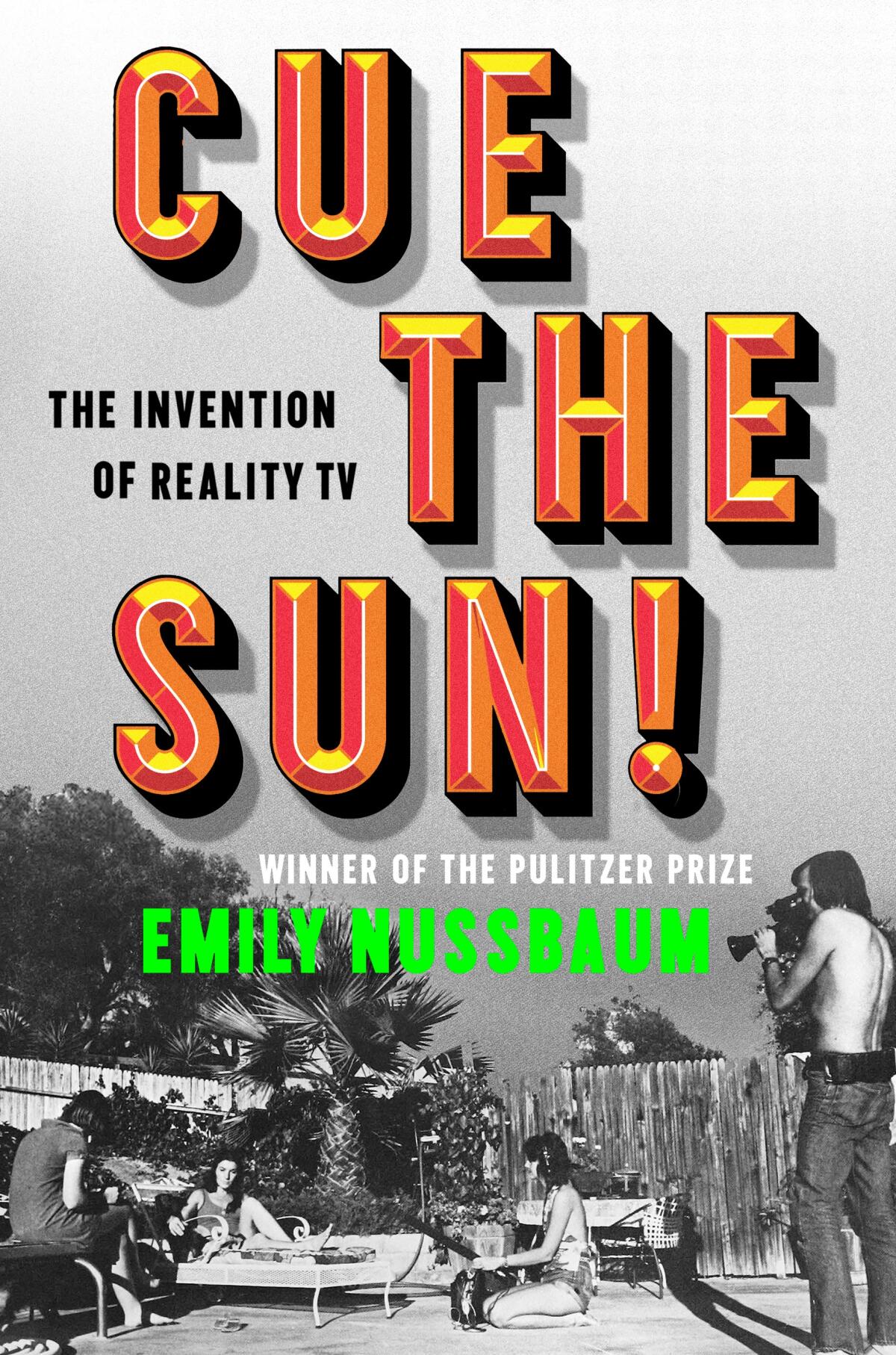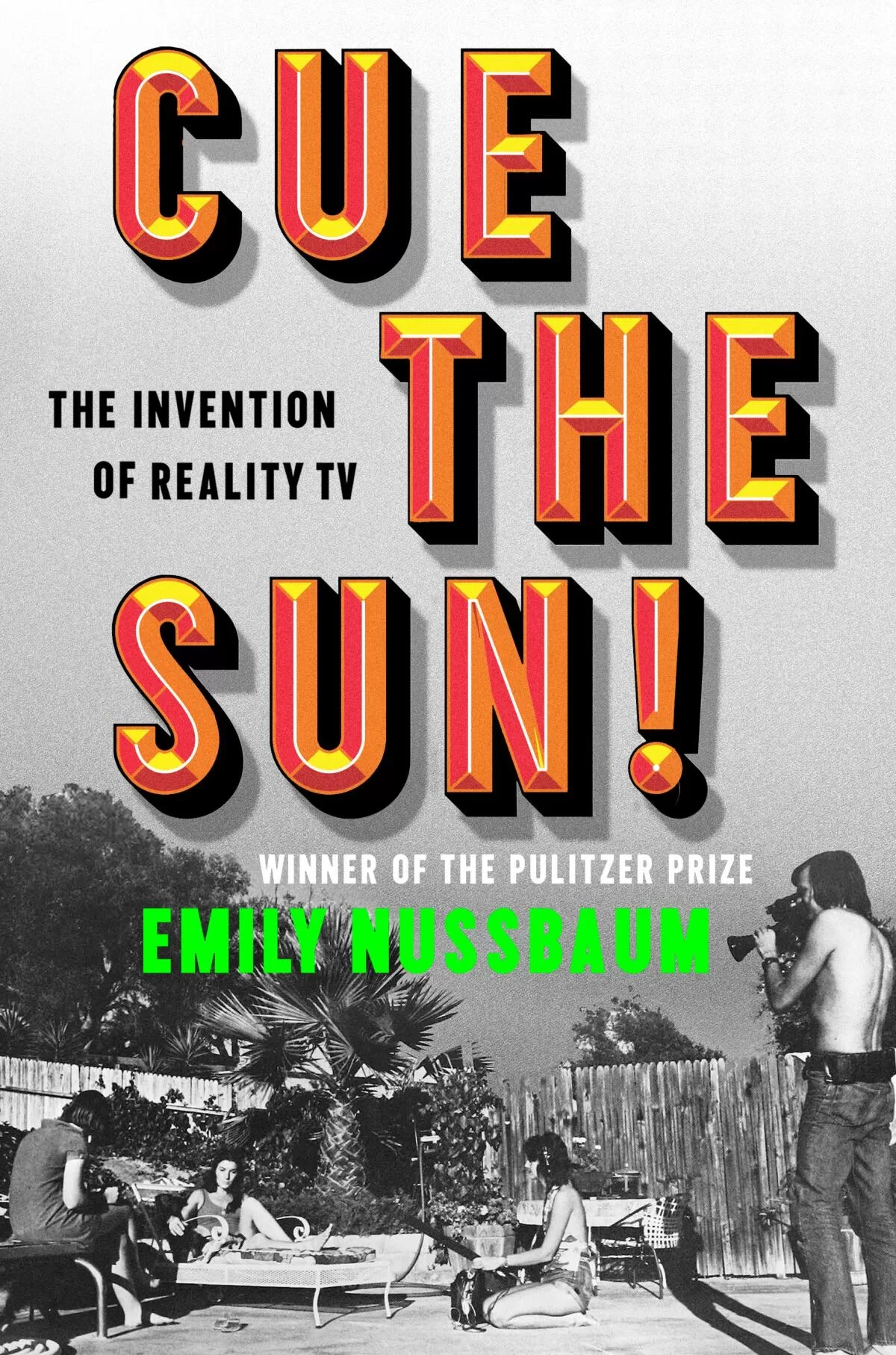On the Shelf
Cue the Sun!: The Invention of Reality TV
By Emily Nussbaum
Random House: 464 pages, $30
If you buy books linked on our site, The Times may earn a commission from Bookshop.org, whose fees support independent bookstores.
Nick Lachey and Jessica Simpson were still “Newlyweds” grappling with the chicken or tuna conundrum when television critic Emily Nussbaum first came up with the idea of writing a book about reality TV.
“I waited 20 years until reality TV was an established industry and I had a career writing about television,” Nussbaum says about the impetus for “Cue the Sun!: The Invention of Reality TV,” which she conceived of in 2003 during a conversation with friends and colleagues amid the explosion of the genre with the shows “The Bachelorette,” “America’s Next Top Model” and “Joe Millionaire.”
Dissuaded by these naysayers, who dismissed the genre as a flash in the pan (insert chortle here), Nussbaum carved out a career in criticism as a culture editor for New York Magazine and as a current staff writer for the New Yorker, covering such prestige shows as “The Sopranos” and “Mad Men” in essays that were collected in her first book, 2019’s “I Like to Watch: Arguing My Way Through the TV Revolution.”
That was part of a two-book deal with Random House, so for her second, Nussbaum thought she’d revisit that idea from two decades ago, not from a critical point of view but from a reported one. Using more than 300 interviews with the people who invented the genre, Nussbaum crafts the story of the origins of reality TV from 1947 to 2009.

But wait — television was a new medium in 1947, let alone reality television. That’s the first clue that “Cue the Sun,” out Tuesday, isn’t your average history of the genre, which Nussbaum calls “dirty documentary.”
While loosely linear, “Cue the Sun!” groups programs by thematic similarities: game shows, prank shows, reality soap operas and clip shows. These include prank show “Candid Camera” and its roots in the radio show “The Candid Microphone,” hence the 1947 date stamp, as well as clip shows such as “America’s Funniest Home Videos” and “Cops,” to which Nussbaum devotes much of the early part of the book.
“Each of those takes cinema verité, which people think of as an elevated discipline where you hold the camera and capture the truth with a lot of patience, and then mix in commercial additives that give it a format: speed it up, make it serialized, make it inexpensive, put pressure on people. That’s how I think of [reality TV],” she says.
Her initial stages of reporting in early 2020 unintentionally foreshadowed the year that would follow: Nussbaum tested positive for COVID-19 and developed long COVID after one of her first reporting trips for the book, which included interviewing the creator of “Cops,” the “charming pirate” John Langley, who looms large over “Cue the Sun!” In June 2020, the clip show was pulled off the air after 33 seasons in response to the Black Lives Matter resurgence that summer. (The show has since resumed.)
“There’s a touchingly naive statement that someone was making, that the problem with ‘Cops’ is not that it would document [police brutality] but that [police] would act nicer on camera [while still committing abuses of power off camera]. And, of course, that’s not an argument that held up because at this point, everyone is a reality producer because everyone has a camera in their hand,” Nussbaum says, conjuring images of civilian-captured police brutality on social media.
Nussbaum doesn’t agree with Langley’s stance on “Cops,” detailed in “Cue the Sun!,” that the program captured raw material and presented it neutrally. However, she acknowledges that it’s “just one show in this book that has major ethical problems.”
One such series that Nussbaum — and, indeed, many others — experiences joy from is “Project Runway.”
“Here’s a show that celebrates creativity, that’s pro-gay … has a fantastic host [in Tim Gunn] who modeled positivity and warmth, [and] is an offshoot of the ‘classy’ ‘Project Greenlight,’ and then I looked into the origins of it and I was like, ‘Oh, yeah, ‘Project Runway’ [was developed] because Harvey Weinstein wanted to have a show about models,’” Nussbaum deadpans with her signature dry wit. (Miriam Haley, a former production assistant on the show, testified at Weinstein’s 2020 trial in New York that the disgraced Hollywood mogul sexually assaulted her at his apartment in 2006.)
While shows such as “Project Runway,” “Survivor” and “The Amazing Race” have all been praised for their contributions to the genre and the culture at large, Nussbaum says it’s actually reality stars who are producers on their own “soft-scripted” shows, like the much-maligned Kardashians, who experience the least problematic conditions.
“The faker a show is, the more ethical it is,” she says. “The people who’ve agreed to be reality stars and ‘play’ themselves, those shows might have their own ethical problems, but they’re not ‘real’ in the same way.”
“Bona-fide amateurs,” a category of reality TV performers that exists somewhere in the gray area among scripted performers, hosts and documentary subjects that Nussbaum discovered while reporting her recent New Yorker article on “Love Is Blind,” are unprotected.
“When I wrote this book, nobody was doing anything to try to protect cast members,” such as former “Real Housewives of New York City” star Bethenny Frankel advocating for reality television stars to unionize amid last year’s strike by members of the Screen Actors Guild-American Federation of Radio and Television Artists. (Nussbaum interviewed producer Andy Cohen for “Cue the Sun!” prior to the filing of several lawsuits against the Bravo franchise from other Housewives.) “This genre is a strikebreaker” that grew out of the 1988 strike by members of the Writers Guild of America that spawned “Cops,” Nussbaum says. “It’s a budget mechanism. It’s a way not to pay writers or actors.”
While it might be hard for some to muster sympathy for reality stars who’ve gone on to make millions from their exposure in the genre, Nussbaum offers this: “[Just] because [some people] find reality stars ridiculous or gross or are villains on the show, which is an edited version of themselves, [doesn’t mean that they don’t] deserve labor rights or to be compensated. The whole idea of the genre as a guilty pleasure prevents people from seeing it as the other things it is, one of which is a workplace.”
